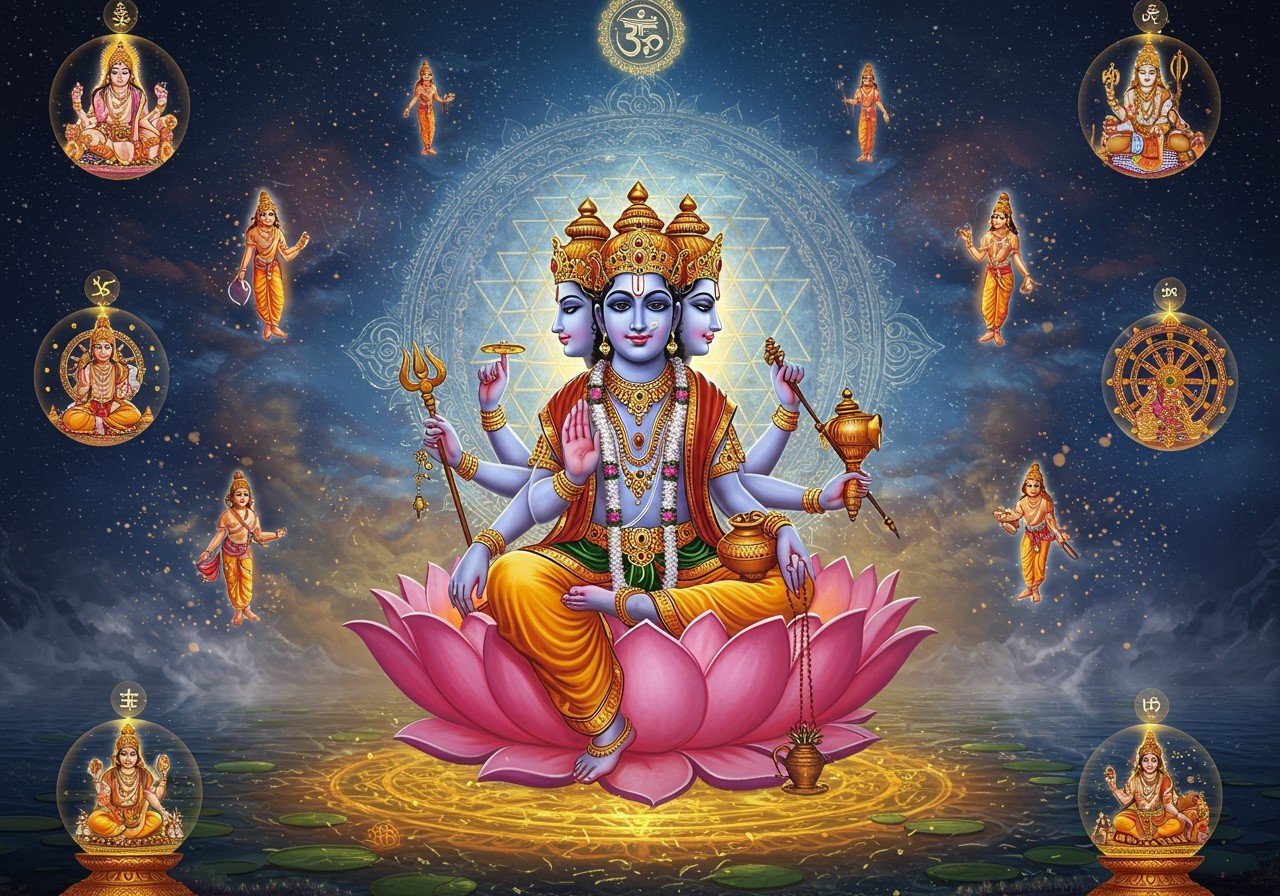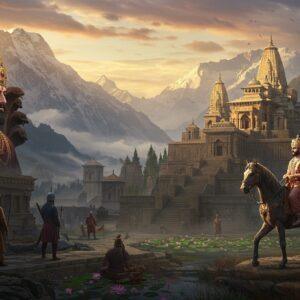
Embark on a journey through Hindu Religious Philosophy, a spiritual path rich with history and diversity. This philosophy weaves together various beliefs, practices, and ideas that have evolved over thousands of years. From ancient Vedic hymns to contemporary interpretations, Hindu thought has shaped spiritual, cultural, and societal landscapes. The Vedas, Upanishads, and other sacred texts lay the foundation, offering profound insights into the nature of reality and the human condition.
Core Concepts of Hindu Religious Philosophy
Understand the core concepts that form the backbone of Hindu beliefs and practices. One key idea is Dharma, a moral law that combines ethical conduct with spiritual discipline, acting as a compass for navigating life’s complexities. It emphasizes fulfilling one’s duties and responsibilities within society and the cosmos. Then there’s Karma, the principle where actions determine future outcomes—emphasizing the cause and effect of behavior, shaping not only present experiences but also future incarnations. Every thought, word, and deed contributes to the unfolding tapestry of one’s karmic journey.
Another important concept is Samsara, the continuous cycle of birth, life, death, and rebirth, driven by the forces of karma. It signifies the ongoing journey of the soul through various lifetimes, accumulating experiences and evolving towards spiritual maturity. Hindus strive for Moksha, liberation from Samsara, which is the ultimate goal of life. This liberation represents freedom from the cycle of birth and death, leading to a state of eternal bliss and unity with the divine. It’s achieved through self-realization and the eradication of karmic debts. Finally, learn about Atman, the individual soul’s inherent connection to Brahman, the universal soul, highlighting the profound unity between the self and the universe. This interconnectedness emphasizes the divine spark within each individual, reflecting the inherent divinity of all creation.
Delving into Hindu Beliefs: A 2025 Perspective
Hinduism, also known as Sanatana Dharma, stands as the world’s oldest living religion. It’s a mystical tradition that guides followers towards inner truth and a realization of the oneness of humanity and the divine. Central to this tradition are core beliefs that have shaped Hindu thought for millennia.
The One Supreme Being: Brahman
Hindus believe in a single, all-encompassing Supreme Being called Brahman. This ultimate reality is both immanent, pervading all creation, and transcendent, existing beyond the limits of human comprehension. Brahman is the source of all existence, the unmanifest reality from which everything emerges and to which everything returns. It is the ultimate truth, the ground of being, and the source of all consciousness. Explore more about the divine with our collection of Laddu Gopal Murtis.
The Divinity of the Soul: Atman
A fundamental Hindu teaching is the divinity of the soul, known as Atman. This inner self is not limited to the body or mind but extends to the spiritual essence, often described as a spark of Brahman residing within each individual. Atman represents the true nature of being, eternal and unchanging. Understanding the nature of Atman is key to realizing Moksha, liberation from the cycle of rebirth. Enhance your spiritual practice with authentic Tulsi Malas from Poojn.in.
Karma and Reincarnation
Hindus believe in Karma, the law of cause and effect. Every action, thought, and word creates karmic impressions that shape future experiences. This principle emphasizes personal responsibility for one’s destiny. The concept of reincarnation, closely tied to karma, suggests that the soul journeys through multiple lifetimes, evolving until all karmic debts are resolved and Moksha is achieved. Learn more about the significance of rituals with our guide on Hindu Rituals.
Moksha: Liberation from the Cycle of Rebirth
Moksha, liberation from the cycle of birth and death, is the ultimate spiritual goal in Hinduism. It’s achieved through detachment from worldly desires and attachments, realizing the unity of Atman with Brahman. Various paths lead to Moksha, including the path of knowledge (Jnana Yoga), action (Karma Yoga), devotion (Bhakti Yoga), and meditation (Raja Yoga). Find peace and tranquility with our range of Shiva Lingams for your meditation practice.
Religious Harmony and Tolerance
Hinduism embraces religious harmony, acknowledging that all genuine spiritual paths are facets of the divine. Tolerance and understanding are essential values, recognizing the diversity of ways to connect with the Supreme Being. This inclusivity fosters respect for different faiths and beliefs. Deepen your understanding of Hindu deities with our comprehensive guide.
Hinduism FAQs – Your Questions Answered (2025)
What is Hindu religious philosophy? Hindu religious philosophy is a complex and nuanced system of thought exploring the nature of reality, the self, and the universe. It encompasses a vast array of ideas, concepts, and practices, including the pursuit of liberation (moksha), the law of karma, and the concept of dharma. It provides a framework for understanding life’s purpose and the journey towards spiritual enlightenment.
Why is Dharma important? Dharma, often translated as duty, righteousness, or moral order, is a fundamental concept in Hinduism. It guides individuals to act in accordance with cosmic and social order, ensuring harmony and balance. Following one’s dharma leads to a fulfilling life and positive karmic consequences. It shapes ethical behavior and societal interactions.
How does Karma influence life? Karma, meaning action, emphasizes the principle of cause and effect. Every action, thought, and word generates karmic impressions that shape future experiences. Understanding karma promotes responsible living and encourages positive actions that lead to beneficial outcomes, both in this life and future ones. It highlights the interconnectedness of actions and their consequences.
What is Moksha? Moksha represents liberation from the cycle of birth and death (samsara), marking the culmination of spiritual evolution. It’s a state of freedom, bliss, and union with the divine (Brahman). Achieving moksha is the ultimate goal of Hindu spiritual practice. It involves transcending worldly attachments and realizing the true nature of the self. Various paths, such as Jnana Yoga, Bhakti Yoga, and Karma Yoga, lead towards this ultimate liberation.
What is the role of the Vedas? The Vedas, ancient scriptures, form the foundation of Hindu philosophy and spirituality. They contain hymns, rituals, philosophical insights, and guidance on living a righteous life. These texts are revered as divinely revealed and offer profound wisdom that has shaped Hindu thought for millennia. They serve as a source of inspiration and knowledge for spiritual seekers. Explore the sacred texts further through our curated selection available on Poojn.in.
Why is meditation important? Meditation is a central practice in Hinduism, fostering self-awareness, inner peace, and connection with the divine. It calms the mind, allowing for deeper introspection and spiritual insight. Regular meditation cultivates mental clarity and emotional stability. It helps individuals connect with their inner selves and experience a sense of tranquility. Find the perfect ambiance for your meditation practice with our collection of sandalwood incense sticks and rose-scented agarbatti.
What role do deities play? Hinduism recognizes a multitude of deities, each representing different aspects of the divine. These deities serve as focal points for devotion and offer a way to connect with Brahman, the ultimate reality. They symbolize various cosmic forces and qualities, enriching spiritual life. Worshipping deities helps devotees cultivate specific virtues and seek divine guidance. Discover more about Hindu Gods and Goddesses on Poojn.in.
How does Hinduism view the universe? Hinduism perceives the universe as a vast, interconnected web of existence. It emphasizes the cyclical nature of time, the interplay of cosmic forces, and the interconnectedness of all beings. This holistic view fosters a sense of reverence for nature and promotes harmonious living within the cosmos. Discover the spiritual significance of Hindu temples with our informative guide.


